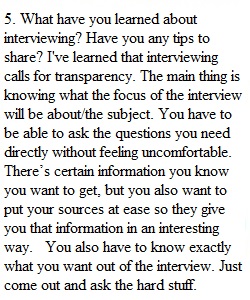


Q Sources & Quotes Have you ever looked at the quotes in a news story and wondered what the reporter was trying to imply about the source? I seem to find myself wondering all the time, especially in sports news and celebrity features. For example, the Washington Post did a piece on professional basketball player Caron Butler, quoting a childhood friend as saying, "We used to see the big dudes come through, with their cars shining. We didn't have nothing." The late Bella Stumbo, of the Los Angeles Times, was sharply criticized for quoting the late Washington, D.C., mayor Marion Barry using words like "wanna" instead of "want to" and "I be sittin'" instead of "I'll be sitting" in this 1990 profile (you may need to open that link in an incognito page in your browser or see this handout), "Barry: He Keeps D.C. Guessing." Before responding to this discussion prompt, please make sure to read "Newsgathering and Interviewing" in the JOUR 201 Manual, Chapter 2 of the Handbook of Independent Journalism, and Chapter 8 on punctuating directly quoted material and Chapter 9 on attribution, both in The News Manual. Then, craft an informed response to address at least one of the following five sets of numbered questions. 1. What is a reporter's obligation(s) to their sources? How about to their audience? 2. Are quotes in the vernacular appropriate or inappropriate? Are they even ethical? 3. How are journalists supposed to handle poor grammar and dialects in our quotes? Why? 4. What are some of the rules for quoting sources? 5. What have you learned about interviewing? Have you any tips to share? Alternatively, you may complete the following: Find and include at least one news story post that used a source's vernacular, and tell us whether the quotes were handled appropriately or inappropriately, and why you think so. Please also tell us: What do you think the reporter was trying to accomplish by writing the story this way? Would you have quoted these sources in the same manner or differently (explain)? Objective: To explain a journalist's obligation(s) to news sources. Deadlines: Initial responses to this discussion question should be posted by 11:59 p.m. ET Saturday. You will need to post your answer before you can see anyone else's responses here. Best practice: Before you submit your initial response to the discussion question, click "subscribe to this thread" beneath the message box. This way, you will receive and be able to respond immediately to notices that someone has commented on your remarks, which can help make these discussions more like conversations. Replies to each other's comments are due by 11:59 p.m. ET Tuesday. You should comment substantively to at least two of your classmates about their posts as well as respond to any inquiries or comments they may make about your post. (Response required.) - 30 - ©2022 University of Maryland Global Campus
View Related Questions